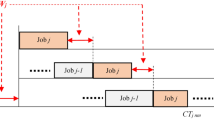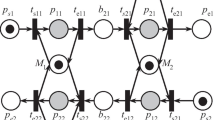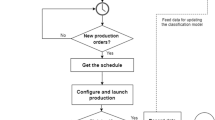Abstract
Due to the fourth revolution experiencing, referred to as Industry 4.0, many production firms are devoted to integrating new technological tools to their manufacturing process. One of them, is rescheduling the tasks on the machines responding to disruptions. While, for static scheduling, the efficiency criteria measure the performance of scheduling systems, in dynamic environments, the stability criteria are also used to assess the impact of jobs deviation. In this paper, a new performance measure is investigated for a flowshop rescheduling problem. This one considers simultaneously the total weighted waiting time as the efficiency criterion, and the total weighted completion time deviation as the stability criterion. This fusion could be a very helpful and significant measure for real life industrial systems. Two disruption types are considered: jobs arrival and jobs cancellation. Thus, a Mixed Integer Linear Programming (MILP) model is developed, as well as an iterative predictive-reactive strategy for dealing with the online part. At last, two heuristic methods are proposed and discussed, in terms of solution quality and computing time.
Similar content being viewed by others
References
Anand R, Aggarwal D, Kumar V (2017). A comparative analysis of optimization solvers. Journal of Statistics and Management Systems 20(4): 623–635.
Bakker M, Tsui K L (2017). Dynamic resource allocation for efficient patient scheduling: A data-driven approach. Journal of Systems Science and Systems Engineering 26(4): 448–462.
Bierwirth Christian, Mattfeld D C (1999). Production scheduling and rescheduling with genetic algorithms. Evolutionary Computation 7(1): 1–17.
Chaari T, Chaabane S, Loukil T, Trentesaux D (2011). A genetic algorithm for robust hybrid flow shop scheduling. International Journal of Computer Integrated Manufacturing 24(9): 821–833.
Chiu Y, Shih C J (2012). Rescheduling strategies for integrating rush orders with preventive maintenance in a two-machine flow shop. International Journal of Production Research 50(20): 5783–5794.
Curry J and Peters B (2005). Rescheduling parallel machines with stepwise increasing tardiness and machine assignment stability objectives. International Journal of Production Research 43(15): 3231–3246.
Duenas A and Petrovic D (2008). An approach to predictive-reactive scheduling of parallel machines subject to disruptions. Annals of Operations Research 159(1): 65–82.
El-Bouri A (2012). A cooperative dispatching approach for minimizing mean tardiness in a dynamic flowshop. Computers & Operations Research 39(7): 1305–1314.
Foumani M, Jenab K (2013). Analysis of flexible robotic cells with improved pure cycle. International Journal of Computer Integrated Manufacturing 26(3): 201–215.
Foumani M, Razeghi A, Smith-Miles K (2020). Stochastic optimization of two-machine flow shop robotic cells with controllable inspection times: From theory toward practice. Robotics and Computer-Integrated Manufacturing 61: 101822.
Guo Y, Huang M, Wang Q, Leon V J (2016). Single-machine rework rescheduling to minimize maximum waiting-times with fixed sequence of jobs and ready times. Computers & Industrial Engineering 91: 262–273.
Guo Y, Wang Q, Huang M (2013). Rescheduling with release time to minimize sum of waiting time considering waiting constraint of original loads. Acta Automatica Sinica 39(12): 2100–2110.
Guo Y, Xie X (2017). Two mixed integer programming formulations on single machine to reschedule repaired jobs for minimizing the total waiting-time. In 2017 Chinese Automation Congress (CAC):2129–2133. IEEE, 2017.
Gürel S, Körpeoğlu E, Aktürk M S (2010). An anticipative scheduling approach with controllable processing times. Computers & Operations Research 37(6): 1002–1013, 2010.
Hall N G, Liu Z, Potts C N (2017). Rescheduling for multiple new orders. INFORMS Journal on Computing 19(4): 633–645.
Hall N G and Potts C N (2004). Rescheduling for new orders. Operations Research 52(3): 440–453.
Han Y, Gong D, Jin Y, Pan Q (2019). Evolutionary multi-objective blocking lot-streaming flow shop scheduling with machine breakdowns. IEEE Transactions on Cybernetics 49(1): 184–197.
Han Y, Gong D, Jin Y, Pan Q (2017). Evolutionary multi-objective blocking lot-streaming flow shop scheduling with machine breakdowns. IEEE Transactions on Cybernetics 49(1): 184–197.
He X, Dong S, Zhao N (2020). Research on rush order insertion rescheduling problem under hybrid flow shop based on nsga-iii. International Journal of Production Research 58(4): 1161–1177.
Herrmann J W (2006). Handbook of Production Scheduling Volume 89. Springer Science & Business Media, 2006.
Hoogeveen H, Lenté C, T’kindt V (2012). Rescheduling for new orders on a single machine with setup times. European Journal of Operational Research 223(1): 40–46.
Ivanov D, Dolgui A, Sokolov B, Werner F, Ivanova M (2016). A dynamic model and an algorithm for short-term supply chain scheduling in the smart factory industry 4.0. International Journal of Production Research 54(2): 386–402.
Jun S, Lee S, Chun H (2019). Learning dispatching rules using random forest in flexible job shop scheduling problems. International Journal of Production Research 57(10): 3290–3310.
Jurcisin R, Sebo J (2015). Basic production scheduling concept software application in a deterministic mechanical production environment. Acta Simulatio 1(4): 1–4.
Kan A R (2012). Machine Scheduling Problems: Classification, Complexity and Computations. Springer Science & Business Media, 2012.
Katragjini K, Vallada E, Ruiz R (2013). Flow shop rescheduling under different types of disruption. International Journal of Production Research 51(3): 780–797.
Katragjini K, Vallada E, Ruiz R (2015). Rescheduling flow-shops under simultaneous disruptions. In 2015 International Conference on Industrial Engineering and Systems Management (IESM): 84–91. IEEE, 2015.
Khorsi M, Chaharsooghi S K, Ali B A, and Ali H K (2020). A multi-objective multi-period model for humanitarian relief logistics with split delivery and multiple uses of vehicles. Journal of Systems Science and Systems Engineering 29: 360–378.
Kianfar K, Ghomi SMT F, Jadid A O (2012). Study of stochastic sequence-dependent flexible flow shop via developing a dispatching rule and a hybrid ga. Engineering Applications of Artificial Intelligence 25(3): 494–506.
Kovalyov M Y, Kress D, Meiswinkel S, Pesch E (2016). A parallel machine schedule updating game with compensations and zero risk. Technical report, working paper, National Academy of Sciences of Belarus and University of Siegen, 2016.
Li J Q, Pan Q K, Mao K (2015). A discrete teaching-learning-based optimisation algorithm for realistic flowshop rescheduling problems. Engineering Applications of Artificial Intelligence 37: 279–292.
Li J Q, Pan Q K, Mao K (2015). A hybrid fruit fly optimization algorithm for the realistic hybrid flowshop rescheduling problem in steelmaking systems. IEEE Transactions on Automation Science and Engineering 13(2): 932–949.
Li R K, Shyu Y T, Adiga S (1993). A heuristic rescheduling algorithm for computer-based production scheduling systems. The International Journal of Production Research 31(8): 1815–1826.
Li Z, Ierapetritou M (2008). Process scheduling under uncertainty: Review and challenges. Computers & Chemical Engineering 32(4–5): 715–727.
Liu F, Wang S, Hong Y, Yue X (2017). On the robust and stable flowshop scheduling under stochastic and dynamic disruptions. IEEE Transactions on Engineering Management 64(4): 539–553.
Liu L (2019). Outsourcing and rescheduling for a two-machine flow shop with the disruption of new arriving jobs: A hybrid variable neighborhood search algorithm. Computers & Industrial Engineering 130: 198–221.
Liu L, Zhou H (2013). Open shop rescheduling under singular machine disruption. Computer Integrated Manufacturing Systems 10(10): 2467–2480.
Liu W, Jin Y, Price M (2017). New scheduling algorithms and digital tool for dynamic permutation flowshop with newly arrived order. International Journal of Production Research 55(11): 3234–3248.
Liu Z, Ro Y K (2014). Rescheduling for machine disruption to minimize makespan and maximum lateness. Journal of Scheduling 17(4): 339–352.
Lodree E J, Jang W, Klein C M (2004). A new rule for minimizing the number of tardy jobs in dynamic flow shops. European Journal of Operational Research 159(1): 258–263.
Mason S J, Jin S, Wessels C M (2004). Rescheduling strategies for minimizing total weighted tardiness in complex job shops. International Journal of Production Research 42(3): 613–628.
Moeuf A, Pellerin R, Lamouri S, Tamayo G S, Barbaray R (2018). The industrial management of smes in the era of industry 4.0. International Journal of Production Research 56(3): 1118–1136.
Muluk A, Akpolat H, Xu J (2003). Scheduling problems — An overview. Journal of Systems Science and Systems Engineering 12(4): 481–492.
Nagasawa K, Ikeda Y, Irohara T (2015). Robust flow shop scheduling with random processing times for reduction of peak power consumption. Simulation Modelling Practice and Theory 59: 102–113.
Nouiri M, Bekrar A, Trentesaux D (2020). An energy-efficient scheduling and rescheduling method for production and logistics systems. International Journal of Production Research 58(11): 3263–3283.
Nurre S G, Sharkey T C (2018). Online scheduling problems with flexible release dates: Applications to infrastructure restoration. Computers & Operations Research 92: 1–16.
Ouelhadj D, Petrovic S (2009). A survey of dynamic scheduling in manufacturing systems. Journal of Scheduling 12(4): 417–431.
Peng K, Pan Q K, Gao L, Li X, Das S, Zhang B (2019). A multi-start variable neighbourhood descent algorithm for hybrid flowshop rescheduling. Swarm and Evolutionary Computation 45: 92–112.
Peng K, Pan Q K, Gao L, Zhang B, Pang X (2018). An improved artificial bee colony algorithm for real-world hybrid flowshop rescheduling in steelmaking-refining-continuous casting process. Computers & Industrial Engineering 122: 235–250.
Pfeiffer A, Kádár B, Monostori L (2007). Stability-oriented evaluation of rescheduling strategies, by using simulation. Computers in Industry 58(7): 630–643.
Pinedo M, Zacharias C, Zhu N (2015). Scheduling in the service industries: An overview. Journal of Systems Science and Systems Engineering 24(1): 1–48.
Qin W, Zhang J, Song D (2018). An improved ant colony algorithm for dynamic hybrid flow shop scheduling with uncertain processing time. Journal of Intelligent Manufacturing 29(4): 891–904.
Rahmani D, Heydari M (2014). Robust and stable flow shop scheduling with unexpected arrivals of new jobs and uncertain processing times. Journal of Manufacturing Systems 33(1): 84–92.
Rahmani D, Heydari M, Makui A, Zandieh M (2013). A new approach to reducing the effects of stochastic disruptions in flexible flow shop problems with stability and nervousness. International Journal of Management Science and Engineering Management 8(3): 173–178.
Rahmani D, Ramezanian R (2016). A stable reactive approach in dynamic flexible flow shop scheduling with unexpected disruptions: A case study. Computers & Industrial Engineering 98: 360–372.
Rangsaritratsamee R, Ferrell W G, Kurz M B (2004). Dynamic rescheduling that simultaneously considers efficiency and stability. Computers & Industrial Engineering 46(1): 1–15.
Sabuncuoglu I, Karabuk S (1999). Rescheduling frequency in an fms with uncertain processing times and unreliable machines. Journal of Manufacturing Systems 18(4): 268–283.
Salido M A, Escamilla J, Barber F, Giret A (2017). Rescheduling in job-shop problems for sustainable manufacturing systems. Journal of Cleaner Production 162: S121–S132.
Tang D, Dai M, Salido M A, Giret A (2016). Energy-efficient dynamic scheduling for a flexible flow shop using an improved particle swarm optimization. Computers in Industry 81: 82–95.
Tighazoui A, Sauvey C, Sauer N (2020). New efficiency-stability criterion in a rescheduling problem with dynamic jobs weights.In 2020 7th International Conference on Control, Decision and Information Technologies (CoDIT), volume 1: 475–480. IEEE, 2020.
Tokola H, Ahlroth L, Niemi E (2014). A comparison of rescheduling policies for online flow shops to minimize tardiness. Engineering Optimization 46(2): 165–180.
Trabelsi W, Sauvey C, Sauer N (2012). Heuristics and metaheuristics for mixed blocking constraints flowshop scheduling problems. Computers & Operations Research 39(11): 2520–2527.
Uhlmann I R, Frazzon E M (2018). Production rescheduling review: Opportunities for industrial integration and practical applications. Journal of Manufacturing Systems 49: 186–193.
Unal A T, Uzsoy R, Kiran A S (1997). Rescheduling on a single machine with part-type dependent setup times and deadlines. Annals of Operations Research 70: 93–113.
Valledor P, Gomez A, Priore P, Puente J (2018). Solving multi-objective rescheduling problems in dynamic permutation flow shop environments with disruptions. International Journal of Production Research 56(19): 6363–6377.
Vieira G E, Herrmann J W, Lin E (2003). Rescheduling manufacturing systems: A framework of strategies, policies, and methods. Journal of Scheduling 6(1): 39–62.
Wang D, Yin Y, Cheng TCE (2018). Parallel-machine rescheduling with job unavailability and rejection. Omega 81: 246–260.
Weng W, Wei X, Fujimura S (2012). Dynamic routing strategies for JIT production in hybrid flow shops. Computers & Operations Research 39(12): 3316–33242.
Wu S D, Storer R H, Chang P C (1993). One-machine rescheduling heuristics with efficiency and stability as criteria. Computers & Operations Research 20(1): 1–14.
Hu Y H, Yan J Q, Ye F F, Yu J H (2005). Flow shop rescheduling problem under rush orders. Journal of Zhejiang University-SCIENCE A 6(10): 1040–1046.
Yang B, Geunes J (2008). Predictive-reactive scheduling on a single resource with uncertain future jobs. European Journal of Operational Research 189(3): 1267–1283.
Yuan J, Mu Y (2007). Rescheduling with release dates to minimize makespan under a limit on the maximum sequence disruption. European Journal of Operational Research 182(2): 936–944.
Zhang G, Cai X, Wong C K (2003). Scheduling two groups of jobs with incomplete information. Journal of Systems Science and Systems Engineering 12(1): 73–81.
Zhang L, Gao L, Li X (2013). A hybrid genetic algorithm and tabu search for a multi-objective dynamic job shop scheduling problem. International Journal of Production Research 51(12): 3516–3531.
Zhao X, Liu N, Zhao S, Wu J, Zhang K, Zhang R (2019). Research on the work-rest scheduling in the manual order picking systems to consider human factors. Journal of Systems Science and Systems Engineering 28(3): 344–355.
Acknowledgments
The authors greatly appreciate the comments of the editor and the referees, which were very helpful for improving the quality of the paper. This work is financially supported by Communauté d’Agglomération Sarreguemines Confluences, France and Région Grand Est, France.
Author information
Authors and Affiliations
Corresponding author
Additional information
Ayoub Tighazoui is a Ph.D. student at the LGIPM (Laboratory of Informatics Engineering, Production and Maintenance) of the “Université de Lorraine” in Metz, France, from which he received his Master’s degree in industrial systems engineering in 2018. He also received his engineer degree in industrial engineering in 2014 from ENSA (National School of Applied Sciences) in Safi, Morocco. His areas of expertise include: mathematical modelling, optimisation methods, operations research, scheduling and applications.
Christophe Sauvey is an assistant professor at the LGIPM (Laboratory of Informatics Engineering, Production and Maintenance) of the “Université de Lorraine”, in Metz, France. He received his engineer degree in electrical engineering from the Polytechnic National Institute of Grenoble (France) in 1997 and his PhD in 2000, on the modelling and optimisation of switched reluctance motors. He received his accreditation to supervise research on modelling and optimisation methods in 2021. His areas of expertise include mathematical modelling, optimisation methods, supply chain management, healthcare systems, logistics, scheduling and applications.
Nathalie Sauer is full professor at the “Université de Lorraine”, Metz, France. She received the M.S. degree in applied mathematics, University of Paris 6, in 1991, the PhD degree in industrial engineering from the University of Metz, France, in 1994, and the HDR (accreditation to supervise research) from the University of Nantes, France, in 2004. In 2005, she joined LGIPM (Laboratory of Informatics Engineering, Production and Maintenance), Metz, and she is currently deputy director of this laboratory. Her research interests include scheduling problems, operations research, modeling, analysis and logistic and production systems optimization.
Rights and permissions
About this article
Cite this article
Tighazoui, A., Sauvey, C. & Sauer, N. Predictive-reactive Strategy for Flowshop Rescheduling Problem: Minimizing the Total Weighted Waiting Times and Instability. J. Syst. Sci. Syst. Eng. 30, 253–275 (2021). https://doi.org/10.1007/s11518-021-5490-8
Published:
Issue Date:
DOI: https://doi.org/10.1007/s11518-021-5490-8




